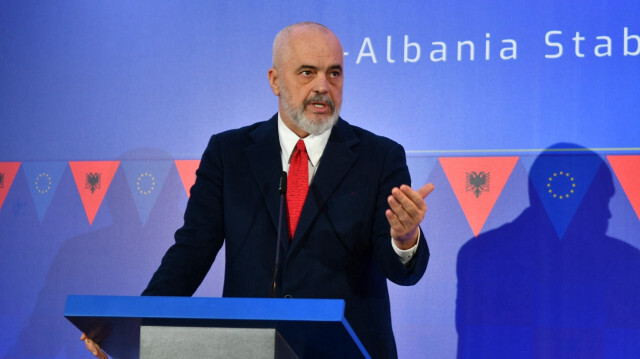
Albanian Prime Minister Edi Rama Wednesday said that the strength of the Serbian army on the border with Kosovo is "zero'' and cannot do anything about the developments in Kosovo.
Rama's remarks came at the Bratislava Global Security Forum (GLOBSEC) in the capital of Slovakia, amid rising tensions in northern Kosovo.
He said that Serbia deploying its army to the Kosovo border is the same as the Mexican army on the US border.
“This is just like the Mexican army appearing on the US border, what can it do? I beg your pardon, I love Mexico, but what can it do? Nothing, absolutely nothing. It's just about domestic politics. What is happening in the north of Kosovo is very much related to domestic politics,” said Rama.
Meanwhile, EU foreign policy chief Josep Borrell met with Kosovo Prime Minister Albin Kurti.
“The current situation is dangerous and unsustainable. We need urgent de-escalation and a solution through dialogue,” said Borrell after the meeting.
Serbia ordered its army Friday to advance to the administrative border with Kosovo and urged NATO to urgently stop violence against local Serbs in Kosovo.
Serbian President Aleksandar Vucic urged the army and security forces to be combat-ready.
Most UN member states, including the US, UK, France, Germany, and Türkiye, recognized Kosovo as a separate country after it declared independence from Serbia in 2008. Serbia, however, continues to regard it as its territory.
NATO chief Jens Stoltenberg on Tuesday announced the deployment of an additional 700 troops in Kosovo due to the ongoing tensions.
His remarks came after at least 30 NATO soldiers were injured in clashes.
- Contentious mayoral elections
Since Monday morning, Serb protesters have gathered outside the Serb-dominated Zvecan Municipality in northern Kosovo to bar newly elected Albanian mayors from entering municipal buildings.
The protesters attempted to breach the police cordon in front of the town hall, the police said in a statement, adding that they used tear gas to disperse the crowd.
KFOR units also used tear gas and stun grenades to disperse the protesters, who did not retreat and responded with stones and sticks.
Last month, Kosovo Serbs boycotted extraordinary local government elections for four municipalities in the country's north. Only 3.47% of eligible voters cast ballots, according to the Kosovo Central Election Commission (KQZ).
After the elections, the EU said in a statement that low turnout did not provide the municipalities with long-term political solutions.
Kosovo Serbs on Saturday called on Vucic to suspend the ongoing dialogue process for normalizing relations with Kosovo, whose 2008 independence neighboring Serbia has never recognized.
The EU requires Kosovo and Serbia to reach a final agreement and resolve disputes to progress in their integration into the bloc.
Hello, the comments you share on our site are a valuable resource for other users. Please respect other users and different opinions. Do not use rude, offensive, derogatory, or discriminatory language.
The floor is all yours.








